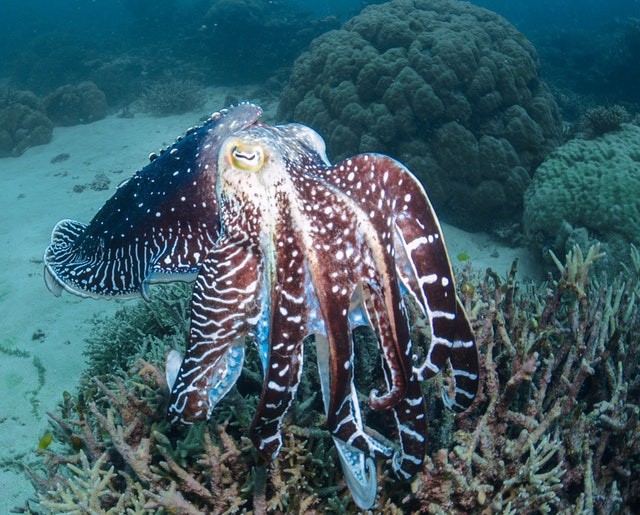A recent test of cuttlefish smarts has braced how significant it is for us humans not to underrate the intelligence of animals.
Cephalopods have been installed to a new edition of the marshmallow test, and the outcome of the test shows proof that there are more strange things going on in their little brains than what we know.
According to researchers, they have the ability to learn and adapt to changes, and this ability could have developed to give cuttlefish a chance in the eat or be eaten world they animate in.

The Marshmallow Test
The Stanford marshmallow test or experiment is pretty open. A child is kept in a room with a marshmallow and they tell them that if they can stay for 15 minutes without eating the marshmallow, they will get another marshmallow, and would be given the chance to eat both.
This ability to defer pleasure shows cognitive abilities like future planning, and it was primarily designed to inquire how human cognition evolves; particularly, the age at which humans are smart enough to defer pleasure if there will be a better outcome.
It can be redressed for animals because it is simple. Clearly, it's not possible to tell an animal that they will get a better reward if they can delay pleasure, but you can train them to know that there will be better food if they don't eat the food in front of them.
Dogs and some primates can defer gratification, even though it can't be consistent. Even Corvids have passed the marshmallow experiment.
Read More : What is Octopus Ink Made Of?
Availability of Prey
Last year, Cephalopods also passed an edition of the marshmallow test. Researchers revealed that common cuttlefish can abstain from feeding on crab meat in the morning once they know that dinner will be something they fancy very much and that's shrimp.
As a team of scientists led by Alexandra Schnell, behavioural ecologist at the University of Cambridge revealed in a new study, however, it is difficult in this case to know whether this change in hunting behaviour in response to the availability of prey was also caused by an ability to apply self-control.

Another Test Designed
Another test was designed for six common cuttles. They placed the cuttles in a special tank with two fenced chambers that had translucent doors so that the animals could see what was inside. Snacks - least chosen piece of uncooked king prawn in one, and another luring live grass shrimp, all these was in the chambers.
There were symbols on the doors that the cuttles had been schooled to recognize. Seeing a circle means the door would open immediately. A triangle signifies that the door would open at a period between 10 seconds and 130 seconds. The door used only in the control condition is a square, meaning that the door stays closed completely.
It's an interesting example of how different species with different lifestyles can have similar behaviors and cognitive talents. The team noted that upcoming study should try to see if cuttlefish are indeed capable of having plans for the future.
For more more news about cephalopods and similar topics don't forget to follow Nature World News!
© 2025 NatureWorldNews.com All rights reserved. Do not reproduce without permission.





